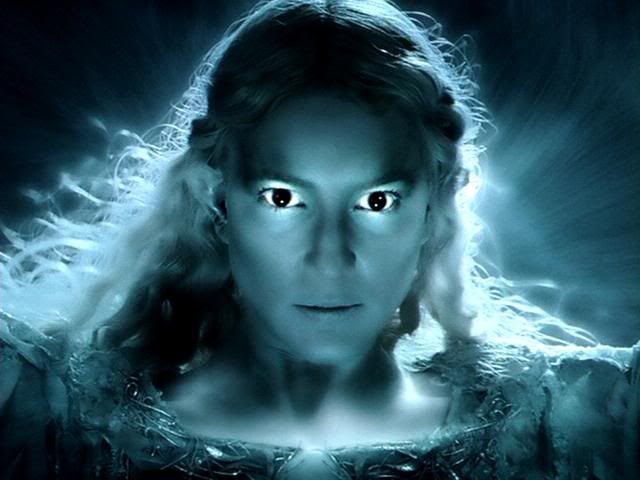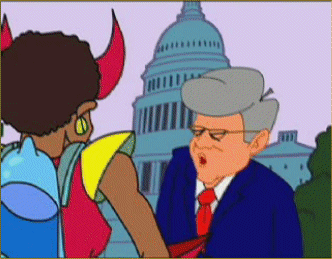One of the subjects that I cover every year in my Apologetics class is the question of whether or not the Church is sexist. During this section we discuss the famous "wives, be submissive to your husbands" passage in Ephesians. Obviously the students' have a whole variety of opinions on this matter, but what essentially comes out of our discussions is the general consensus that while men and women are equal, their roles are not merely interchangeable. However, on occasion a student will try to argue that the differences are purely cosmetic; "defining men and women in such a limited way is not only anachronistic, but frankly insulting." In a way this critic is right, consigning the sexes to these narrow categories is wrong, not because these categories are altogether false, but because they can only begin to tell the story of what men and women mean respective to the human race. Indeed, how can one even begin to explain what the word "mommy" represents to a child, or what the behavior of a father (for good or ill) means to his son. Some truths are just too large to be summarized in a clever meme.
 |
| The classic Ephesians stereotype |
I remember one year in particular a former student of mine objecting to these "binary" categories on similar grounds. My sense was that she simply felt that "loving" was the same as loving, and that whether you are a man or a woman, it essentially comes down to the same thing. Consequently, she explained, the differences spelled out in a passage like Ephesians are at best unnecessary, and at worst misogynistic. She felt particularly irritated when we discussed the importance of the role of men in families. In spite of all my efforts to prove to the contrary, she left class that day visibly displeased with me and unsatisfied by my answers. The subject was never again broached in class, but several months later we ran into each other at Mass. After a brief (but pleasant) exchange, she walked away- and I would of thought nothing more of the issue… but for something my wife said to me; "Was that a pentagram on her handbag?" When it comes to fashion, I try to give my students as much leeway as possible, but frankly it creeped me out that she would bring something like that into Mass with her.
The pentagram has a bit of a murky history, but in recent decades it has come to be associated with the occult, and in particular with Wicca/witchcraft. The truth is it may have only been an accident. She may have known nothing of its implications, and simply brought it in because she liked the way it looked. However, considering her general cultural savviness, and her overall intellectual awareness, I would be relatively shocked if she knew nothing of its larger meaning. But whatever her intentions, there is an interesting correlation here, a logical connection between Wiccan spirituality and feminism, a link between neo-paganism, and this girl's general displeasure with traditional notions of masculinity.
Oftentimes, especially in our day and age, there is a very sympathetic reason why women are compelled to reject classical notions of masculinity (see the above photo), and quite frequently, it has very little to do with what it means to be a Christian. Many women are hurt and angry at men, not because men exhibit Christian chivalry, but because they exhibit pagan chauvinism. Thus embittered, these women are commonly drawn to a form of feminine idolatry which is presented and celebrated under the guise of gender equality. In any case, androgyny is not equality, it is rather the worst of both worlds, for it seeks to feminize what is masculine, and masculinize what is feminine. While the temptation is understandable (especially in a world where men are constantly abrogating their duties), choosing to worship everything feminine (as well as effeminate), often reduces the female species to a bunch of self-absorbed divas/tyrants.
Ironically, women who submit to this kind of thinking shut themselves off to true affection and equality, either because they will not countenance any man who is masculine enough to have his own thoughts, or because they have allowed themselves too often to be vulnerable to the wrong type of men. It is a sad fate to consign one's self to this sort of isolation out of fear of being used and/or hurt by the aforementioned "scrub". However, every romantic story/relationship is predicated, not upon a narrative of dominance, but upon a magnificent see-saw of shifting power, a see-saw which only elevates in order to elevate the other person. The solution is not to take away a man's masculinity, it is to teach him how to use it in the service of his beloved. If you take away the unique power of one or the other, the game ends, and you really do have quite a boring game of see-saw. Yet the point here is not simply to come up with a quaint, if helpful, metaphor to describe the nature of romance- but rather to learn how to love something outside of yourself, something which is radically different from you. Allowing another to have power over you (i.e. being vulnerable) is one of the prerequisites of love. If you cannot be "had" then you cannot know love. However, the deeper purpose of learning how to love and serve the opposite sex goes well beyond pure sentiment. Indeed, when I learn how to serve my wife, I learn how to love and serve God (i.e. another one who is radically different from myself, and who also seems incomprehensible to me at times). Thus, the problem with nature worship is that in the end it is not worship at all, but rather self-worship.
But worst of all, what Wiccan spirituality really embodies is something which is utterly antagonistic to true feminism. Ironically, this hyper-identification with mother-earth actually militates against femininity. In fact, this type of spirituality is more akin to the hyper-masculinity of Sharia Islam. For both in many ways are a kind of fearful repudiation of the opposite sex. In the case of the former, it is an ideology which exists (in part) as a means of rejecting patriarchal authority, while in the case of the latter it exists (at least in part) to muffle and hide the more subversive and democratic power of the feminine. The true compromise between these extremes can be more clearly seen in the tenets of Christianity; the vertical and the horizontal cross-beams of the crucifix, the creation and redemption of mankind, the magnificent maternity and paternity that are perpetually celebrated in the Church. But as it is we are presently embroiled in a war of the sexes. One side wants to neuter man and make him androgynous, while the other side wants to drape femininity with a kind of curtain of indistinguishability. But as Scripture clearly reveals, both men and women together comprise the face of God. Hence, to remove the beauty and power of even one of the sexes is to disfigure His image altogether, and to usher in an age which is truly impotent and incapable of revealing the glory of God.



















